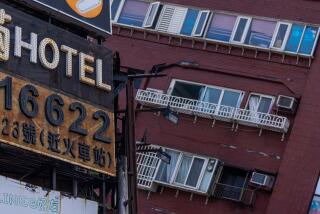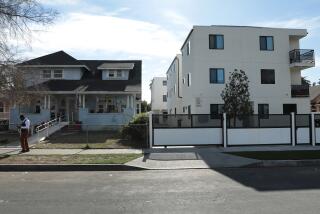Fixing L.A. buildings vulnerable to collapse is vital before next big earthquake, Garcetti says
Los Angeles Mayor Eric Garcetti said the significant destruction and death toll from Tuesday’s earthquake in Mexico should prompt owners and local governments across California to get more buildings retrofitted to withstand quakes as soon as possible.
A viral video capturing the collapse of a five-story concrete building — remarkable for the detail it shows of how such structures behave in an actual quake — has become a startling and visceral illustration for how seemingly solid buildings can become brittle and crumble when shaken side to side.
“Any building owner who thinks they should sit back and relax for the next 20 years should view that video. And let’s figure out a way to get to work now,” Garcetti said.
“What’s more expensive,” he said, “the loss of your entire property — let alone the loss of lives — or the investment in making sure that no earthquake of that size will destroy your building or kill anyone?”
Structural engineers in California say it’s clear that brittle concrete buildings were a major reason for many of the deaths caused by Tuesday’s magnitude 7.1 quake in central Mexico. Only a few local governments around the world have required that brittle concrete buildings be retrofitted, and Los Angeles was one of the first to do so in 2015.
Garcetti proposed the retrofit law, requiring that concrete buildings and wooden apartment buildings with flimsy ground floors be retrofitted by a certain deadline.
Requiring concrete buildings to be retrofitted was at one time controversial in Los Angeles, given the expense, which can exceed $1 million for a large structure. L.A.’s seismic safety law permitted a lengthy deadline — 25 years to retrofit a concrete building once the city issues an order requiring the building be seismically evaluated for risk of collapse.
(The deadline for wooden apartment buildings is shorter — seven years after an order is given.)
But Garcetti said the destruction this week in Mexico City underscores how important it is to get those buildings retrofitted well before the 25-year deadline.
“The images from Mexico reinforce the route that we took and the importance — despite the expense — of including concrete buildings in our legislation,” the mayor said. “Looking at those horrific images and seeing the tragic consequences remind me of our No. 1 responsibility to save lives, and not just try to calculate a dollar amount of, ‘too much,’ to save a life.
“That said, it also makes me uneasy thinking of 25 years — we picked the compromise of ... putting a mandate that’s very strong, and we were very flexible about the timeline,” Garcetti said.
For now, Garcetti is not proposing a change in law to shorten the deadline to retrofit concrete buildings. But, he said, it would help owners to make it easier to obtain loans to do retrofits, whether they be publicly or privately financed, so they wouldn’t have to pay for the costs all up front.
The mayor called on other cities throughout California to start looking to L.A.’s retrofit plan as a model.
“Our next step is to do whatever we can on our watch to go even further,” Garcetti said. “If the biggest city in the state can do this, then you can do it, too, in your own backyard.”
Garcetti congratulated other cities, such as Santa Monica, for going one step step beyond L.A. in requiring retrofitting of a certain class of steel frame building found to be vulnerable to fracturing in an earthquake. He said officials at L.A.’s Department of Building and Safety are studying the Santa Monica law to assess it.
More to Read
Start your day right
Sign up for Essential California for news, features and recommendations from the L.A. Times and beyond in your inbox six days a week.
You may occasionally receive promotional content from the Los Angeles Times.







